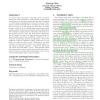Free Online Productivity Tools
i2Speak
i2Symbol
i2OCR
iTex2Img
iWeb2Print
iWeb2Shot
i2Type
iPdf2Split
iPdf2Merge
i2Bopomofo
i2Arabic
i2Style
i2Image
i2PDF
iLatex2Rtf
Sci2ools
146
click to vote
HPDC
2011
IEEE
2011
IEEE
Algorithm-based recovery for iterative methods without checkpointing
In today’s high performance computing practice, fail-stop failures are often tolerated by checkpointing. While checkpointing is a very general technique and can often be applied to a wide range of applications, it often introduces a considerable overhead especially when computations reach petascale and beyond. In this paper, we show that, for many iterative methods, if the parallel data partitioning scheme satisfies certain conditions, the iterative methods themselves will maintain enough inherent redundant information for the accurate recovery of the lost data without checkpointing. We analyze the block row data partitioning scheme for sparse matrices and derive a sufficient condition for recovering the critical data without checkpointing. When this sufficient condition is satisfied, neither checkpoint nor rollback is necessary for the recovery. Furthermore, the fault tolerance overhead (time) is zero if no actual failures occur during a program execution. Overhead is introduced ...
Actual Failure | Checkpointing | Distributed And Parallel Computing | HPDC 2011 | Sufficient Condition |
Related Content
| Added | 20 Aug 2011 |
| Updated | 20 Aug 2011 |
| Type | Journal |
| Year | 2011 |
| Where | HPDC |
| Authors | Zizhong Chen |
Comments (0)

